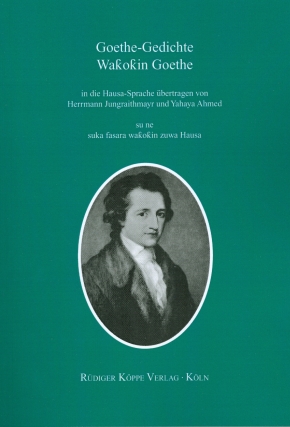
Goethe-Gedichte – in die Hausa-Sprache übertragen
Wakokin Goethe – su ne suka fasara wakokin zuwa Hausa
Author: Johann Wolfgang von Goethe †. Translated by: Yahaya Ahmed, Herrmann Jungraithmayr. Edited by: Herrmann Jungraithmayr, Yahaya Ahmed.
200610 pp. Roman, 97 pp.
1 facsimile reproduction
Text language(s): German, Hausa
Format: 148 x 210 mm
170 g
Paperback
€ 26.80
Buy 'Goethe-Gedichte – in die Hausa-Sprache übertragen' as a downloadable PDF document directly from our online shop »
Order 'Goethe-Gedichte – in die Hausa-Sprache übertragen' as print edition »
In the year 1999 the city Frankfurt / Main (Germany) celebrated the 250th birthday of its greatest son Johann Wolfgang von Goethe (1749–1832). At this occasion it turned out that not a single work Goethe’s has been translated into one of the approximately 2,000 African languages until now. To change this sad deficit, Herrmann Jungraithmayr, african linguist at the Goethe University of Frankfurt, and his long-time colleague Yahaya Ahmed, a Hausa from North Nigeria, started translating Goethe’s poems into the Hausa language, placing emphasis on the poems which have a reference to the world of the Islam (in Westöstlicher Divan, one of Goethe’s anthologies: „Im Islam leben und sterben wir alle.“ [We all live and die in the Islam.]). The Hausa language – one of the most important languages in West Africa – is spoken by about 40 million people, mainly Muslims.
This is the first attempt to built a poetic bridge between two totally different cultures – the old Christian Europe and the Islamic Central Africa –, and it is a courageous initial transporting a piece of Goethe’s open mind into the sentimental value and mental world of the Hausa people. So for the first time Goethe is entering the world south of the Sahara with its excess of phantasy and mental creative power. The elaborate introduction gives the reader many detailed information about the history of origins of the poems, the importance and prominence of Hausa as a lingua franca and a literature language, and about the procedural method of the translation process.
Adjacent, twenty Goethe poems and their translations are presented. A poem written by one of the editors himself completes this book. The whole work is bilingual, well arranged, and easily manageable, the German texts can be found on the left pages fronting the Hausa translations on the right pages.
For learning Hausa and advanced studies, you will find a lot of study books, dictionaries, festschrifts, paper collections and text editions:
Accompanying material:
- Aspects of the Aesthetics of Hausa Verbal Art
(ISBN 978-3-89645-264-1 ) - Dialoge, Prosa und Liedtexte aus dem Lehrbuch der Hausa-Sprache (Audio-CD)
(ISBN 978-3-89645-007-4 ) - Dictionary of Hausa Crafts / Kamus na Sana’o’in Hausa
(ISBN 978-3-927620-52-0 ) - From Oral Literature to Video
(ISBN 978-3-89645-579-6 ) - Grammatical and Semantic Relations in Hausa
(ISBN 978-3-89645-540-6 ) - Hausa Comparative Dictionary
(ISBN 978-3-927620-53-7 ) - Lehrbuch der Hausa-Sprache
(ISBN 978-3-89645-006-7 ) - Lehrbuch der Hausa-Sprache mit Audio-CD
(ISBN 978-3-89645-008-1 ) - Narrator as Interpreter
(ISBN 978-3-89645-102-6 )
Cross-reference:
- African Linguistics in the 21st Century
(ISBN 978-3-89645-765-3 ) - Alltägliche Zauberei
(ISBN 978-3-89645-310-5 ) - Berber Loanwords in Hausa
(ISBN 978-3-89645-391-4 ) - Bibliography of Hausa Popular Fiction 1987–2002
(ISBN 978-3-89645-277-1 ) - Chadic and Hausa Linguistics
(ISBN 978-3-89645-043-2 ) - Hausa in the Sudan
(ISBN 978-3-89645-105-7 ) - Hausa Verbal Compounds
(ISBN 978-3-89645-292-4 ) - Klingenheben’s Law in Hausa
(ISBN 978-3-89645-521-5 )
| « back | Print version | [top] |
 Books
Books Audio
Audio Biographies
Biographies Series
Series Festschrifts
Festschrifts Journals
Journals